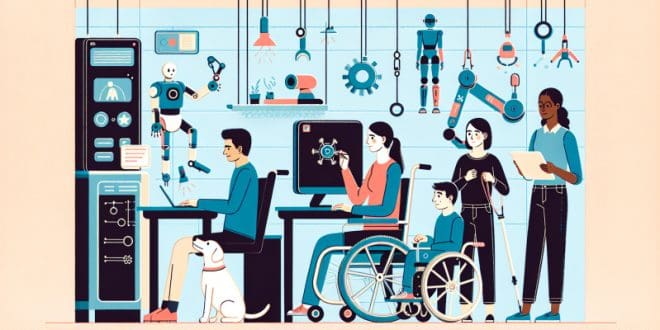As the march of technology quickens, every facet of our lives feels the impact, and the workplace is no exception. The future of work, buoyed by automation and artificial intelligence (AI), holds the promise of unparalleled efficiency and productivity. However, within this shining vision lurks a significant challenge: ensuring that the workplace revolution does not leave behind individuals with disabilities, who have historically faced barriers to employment and inclusion.
The rise of automation may render certain jobs obsolete, but it will invariably create new opportunities as well. For people with disabilities, these changes have the potential to be both liberating and limiting. Assistive technologies can provide unprecedented access to tasks and roles that were previously inaccessible. Yet, without intentional efforts to foster inclusive employment practices, automation could exacerbate existing disparities.
Policymakers play an essential role in shaping the landscape of employment. Legislation must be forward-thinking, not only safeguarding the rights of disabled workers but also encouraging companies to embrace inclusivity as a core value. Grants and incentives could be provided to businesses that actively work to make their workplaces more accessible and that invest in training programs tailored to the needs of w樂威壯
orkers with disabilities.
Non-profit organizations are the connective tissue between policy and practice, often spearheading initiatives that support career development and job placement for people with disabilities. They can launch awareness campaigns, provide resources to businesses looking to become more inclusive, and offer direct support to individuals navigating the evolving job market.
The private sector has a pivotal role as well. Beyond compliance with regulations, companies have the opportunity to lead the charge in inclusive hiring practices. This can involve investing in ergonomic workspaces, flexible job structures, and a culture of inclusion that starts at the executive level and filters through every aspect of the company.
Grants Club stands at the confluence of opportunity and advocacy. By directing funding to innovative projects that aim to create inclusive employment solutions, we can propel the conversation from what is required by law to what is possible through imagination and initiative. We have the chance to set a standard for how grants can build bridges威而鋼
to employment for those with disabilities in an age increasingly dominated by automation.
The role of grant-makers and funders in shaping this future is clear. By investing in research that identifies the most effective approaches to inclusive employment, as well as funding initiatives that pilot these approaches, Grants Club can contribute to a foundational shift in how work is perceived and performed.
In conclusion, automation and the future of work present both challenges and opportunities for the inclusion of people with disabilities. As a community of researchers, grant-makers, and non-profit professionals, we must collaborate across sectors to advocate for policies, practices, and funding that support innovative and accessible employment. Let us embrace the potential of this technological revolution to create a more inclusive society, where everyone has the opportunity to contribute their talents and skills.
 Grants Club Community
Grants Club Community




